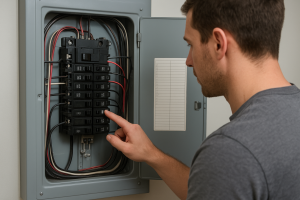The house quietens, the TV turns off, and the lights flutter. The electricity is not there. Everything running on electricity—heaters, air conditioning, refrigerators, internet routers—stop operating right away. As the reality sets in, time slows down. The unfolding of events will hinge on the presence of a backup plan.
A power outage can last for a few minutes, several hours, or occasionally even days. Short outages can be bothersome, but extended ones interrupt daily life, pose safety hazards, and cause added stress. Food in the fridge starts to spoil. The air indoors feels stifling. Essential tasks or messages come to a standstill. This is when a backup generator transforms from merely an additional tool to a vital element, bridging the gap between unpredictability and readiness.
How Backup Generators Work
Generators provide electricity during outages of the primary power source. They convert fuel—such as gasoline, diesel, propane, or natural gas—into energy that powers essential appliances and devices.
There are two main types of generators:
- Portable Generators – Smaller and mobile, these are useful for occasional power outages or temporary outdoor use. They need to be set up by hand and require refueling.
- Standby Generators – Permanently installed and connected to a fuel source, these automatically switch on when power is lost. They provide a more reliable backup for homes and businesses.
Each type has its strengths, but the right choice depends on how much power is needed and how often outages occur.
What Can a Backup Generator Power?
Not all generators can run an entire household, but they can keep the essentials running, such as:
- Refrigerators and Freezers – Prevents food from spoiling, saving money and reducing waste.
- Heating and Cooling Systems – Supports a cozy indoor climate.
- Lights – Ensures visibility and security during the outage.
- Medical Equipment – Provides continuous operation for critical health devices.
- Wi-Fi and Communication Devices – Keeps internet access and phone charging available.
Choosing the right generator means understanding which appliances are a priority and how much power they require.
Common Misconceptions About Generators
Generators offer a practical backup plan, but there are many misunderstandings about how they work. Here are a few of the most common ones:
- “A small generator can power everything.” Most portable generators have limits. Running an entire home on a small unit can overload the system.
- “Generators can run indefinitely.” Fuel supply is a key factor. Even standby generators with direct gas connections need regular maintenance.
- “Installation is simple.” Portable generators are simple to set up, whereas standby generators need professional installation for safety and efficiency.
- “Any fuel type works the same.” Gasoline is readily available, but it does not last long. Propane lasts longer, and natural gas offers an uninterrupted supply when available.
Grasping these details allows for smoother planning and helps sidestep unforeseen surprises.
Safety Considerations When Using a Generator
Generators provide power when it’s needed most, but they must be used correctly. Using it incorrectly can result in significant dangers, such as carbon monoxide poisoning, fire risks, and electrical problems:
- Keep generators outdoors – Running a generator inside a home or garage can create deadly carbon monoxide buildup.
- Use heavy-duty extension cords – Inferior cords may become excessively hot, raising the danger of fire.
- Avoid overloading the generator – Exceeding its capacity can cause damage or sudden shutdowns.
- Turn off before refueling – Adding fuel to a running generator can lead to dangerous flare-ups.
- Install a transfer switch – This prevents power from feeding back into utility lines, protecting both the home and utility workers.
Taking the right precautions ensures that a backup generator remains a reliable and safe source of power during an outage.
Fuel Storage and Maintenance Tips
Generators only work as long as they have fuel, so storage and maintenance are essential.
- Store extra fuel safely – Store gasoline or propane in approved containers, ensuring they are kept out of direct sunlight and away from heat sources.
- Use fuel stabilizers – Gasoline degrades over time, but additives help extend its usability.
- Run the generator regularly – Start it up every few months to keep the engine in working condition.
- Check oil levels and filters – Maintaining clean filters and ensuring proper oil levels allows the engine to operate effortlessly.
- Schedule inspections – Periodic professional check-ups prevent breakdowns when the generator is needed most.
Planning ahead makes all the difference. A generator that hasn’t been maintained may not start when it’s needed.
When Is a Generator a Good Investment?
A backup generator is useful for anyone who wants to avoid interruptions due to power outages. However, some situations make it especially valuable:
- Living in an area with frequent outages – If power loss happens often, a reliable backup makes life easier.
- Relying on medical devices – Continuous operation is necessary for safety and health.
- Working from home – Maintaining connections is vital for working remotely and conducting online business activities.
- Extreme weather conditions – Heat waves, cold snaps, hurricanes, and winter storms can leave homes without power for days.
- Avoiding food waste – A generator keeps refrigeration running, preventing unnecessary loss.
For those who experience occasional outages, a portable generator may be enough. For those needing continuous backup, a standby generator is worthwhile.
Final Thoughts
Though they are erratic, power outages may be avoided entirely with preparedness. Having a backup plan in place eliminates the uncertainty associated with unexpected blackouts, whether selecting a small portable unit for short usage or a standby generator for full-house coverage. Knowing how generators run, what they can run on, and how to utilize them properly guarantees that they provide precisely what they are supposed to—stability when it counts most.








